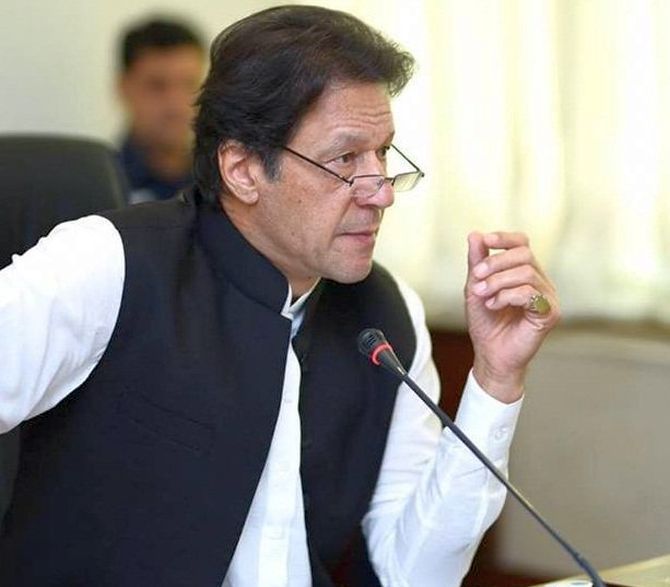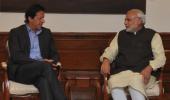If he doesn't, two things are guaranteed: Failure for him, and continued slide for his nation despite its talented people, strong nationalism, the gift of geography and a formidable army, points out Shekhar Gupta.

There are two challenges when you talk about Pakistan today.
First, whether you focus on the history, geography or politics.
And second, whatever tack you choose, where do you begin?
I could have begun, for example, with 2019. I could have also chosen 2009, 1999, 1989 or 1979. I am taking you back, instead to 1969.
It was in 1969 that Muslim countries, smarting under Israel's spectacular victory in the six-day-war of 1967 decided to form Organisation of Islamic Conference.
Indira Gandhi wasn't about to stay out and decided to send minister Fakhruddin Ali Ahmed (later President of India) as head of the Indian delegation.
Her move was thwarted by an outraged Pakistan.
It found sympathy in the ummah.
The Islamic world accepted the logic that there could be no OIC without the country with the largest Muslim population in the world at the time.
Remember, Pakistan was yet undivided.
India was left rejected and humiliated.
Jump exactly 50 years to March 1, 2019.
Watch External Affairs Minister Sushma Swaraj holding forth at the OIC summit as an honoured guest.
She delivered a finely crafted speech, which underlined India as a home to the third-largest Muslim population in the world.
She said Muslims were integral to India's diversity and, less than 100 of them had joined ISIS.
Of course, there will be many valid arguments and qualifications here, over her party's marginalisation and 'Otherisation' of the mainstream Indian Muslim and the demonisation of Kashmiris.
But please do not overlook at the significance of a top woman leader of a conservative Hindu nationalist Indian government saying this to the world's Muslims.
Even more, you can't miss the supreme irony of a sulking Pakistan staying out of this OIC summit in protest against the invitation to India.
Fifty years ago, Pakistan had the power to veto India's presence at the premier Islamic alliance.
Today, all it can do is express hollow peeve and humiliation with a boycott.
How did Pakistan, which calls itself the 'Citadel of Islam' (Islam ka Qila), with its nukes and missiles, 20 crore Muslims, get itself in such a sorry place? Think about it.
I will now drag you back 40 years to 1979.
Pakistan lost the 1971 war and broke up.
It was still rebuilding itself -- and quite well -- when the Soviet Union invaded Afghanistan.
It brought America and its allies, including Saudi Arabia and China in as, what is now called, the Af-Pak region became the hottest battlefield of the Cold War.
Pakistan was their willing, capable and indispensable ally.
This started the process of easy and free re-arming of the Pakistani military, strengthened new dictator Zia-ul Haq who, over time, began to see himself as the true commander of this jihad.
The new power had gone to his head.
If they could lead this war against a superpower, why couldn't they do so against India? This grew into a kind of national hubris.
Please note again that militancy began in Indian Punjab in 1981, the AK-47s appeared the following year, and then RPG-7 grenade-launchers.
These were standard Afghan jihad weapons.
I made my first visit to Pakistan as this phase was peaking, in the summer of 1985, to cover the trial of Sikh hijackers of an Indian Airlines aircraft.
I was awed by the difference in the levels of ordinary people's prosperity, quality of life, infrastructure, even the quality of telecom services, which was like oxygen for journalists in the pre-Internet era.
In short, the average Pakistani lived much better than the average Indian in 1985.
Data tells you why.
Pakistan's per capita income then was about 60 per cent higher than India's.
Apologies for doing this to you again, but leapfrog to 2019.
Now, the average Indian earns about 25 per cent more than the average Pakistani.
How did the Pakistanis, despite their newfound geo-strategic value for those winning the Cold War, lose a 60 per cent head start and slip so far behind? That gap is increasing almost by five percentage points every year.
The Indian economy is growing by about three percentage points faster than Pakistan's, whose population is rising at twice the pace of India's.
The net result is a near-five per cent, steady differential in per capita GDP.
How did we get here? Zulfikar Ali Bhutto famously threatened a 1,000-year war on India.
In the 50 of these since 1969, Pakistan has so lost its pre-eminence that even its ummah prefers India to it.
In the 40 years since it embraced jihad, it has ruined its economy.
But wait, this isn't all the price Pakistan has paid for this permanent blood feud with India. Keep adding.
By 1989, the defeated Soviets were negotiating their retreat from Afghanistan.
A victorious Pakistani establishment instinctively turned its attention east.
This is precisely when the ongoing troubles in Jammu and Kashmir began.
The self-styled Ghazis in khaki were now going to win the jihad that really mattered to them.
The next three years were the bloodiest.
Kashmir and Punjab counted corpses by the thousands.
But Pakistan grappled with some internal changes.
Democratic forces fought back often, and Zia's legatees were engaged in an internal tussle with politicians.
Nawaz Sharif, originally an army favourite, preferred peace.
He dared, exactly a decade after the insurgency in Kashmir was launched, to make peace with Vajpayee, in January 1999.
His army responded by infiltrating Kargil that winter.
Pakistan lost that war and two more important things: One, the larger global view that Kashmir was a disputed territory ended.
There was new unanimity that the Line of Control was the de facto border and must be respected.
Second, the same year, Pakistan lost its hard-earned democracy again as Pervez Musharraf toppled Nawaz.
In those 10 years, therefore, Pakistan lost its moral cause on Kashmir and returned to military rule.
All because of that one self-destructive obsession.
We have come a long way since.
With the madness of 26/11 Pakistan earned the awful but well-deserved status as the locus of global jihad.
Then, as during the Kargil and post-Parliament attack standoffs, India had the world on its side by acting responsibly and not retaliating.
Today, India has the world, including Saudi Arabia and UAE, on its side even after it retaliated.
Let's make a balance sheet.
In 50 years, Pakistan lost its pre-eminence in the Islamic world.
The Arabs are counselling restraint to it, Iran is hostile.
In the past 40 years, its per capita income has suffered almost a 90 per cent net deficit relative to India and the gap is rising.
In the past 30, it has lost its campaigns in Indian Punjab and Kashmir, and permanently embedded jihadis in its cities and institutions.
And in the last two decades, the LoC has become the de facto border in Kashmir, nobody has any patience with terror as an instrument of policy, there isn't even token disapproval of India bombing Pakistan's mainland, and most importantly, India and the world have called Pakistan's nuclear bluff.
Imran can carry on as in the past, or take fresh guard and begin a new inning.
It will be risky, but there is a chance of success if he dares.
If he doesn't, two things are guaranteed: Failure for him, and continued slide for his nation despite its talented people, strong nationalism, the gift of geography and a formidable army.
That's the bottom line.
By Special Arrangement with The Print












 © 2025
© 2025